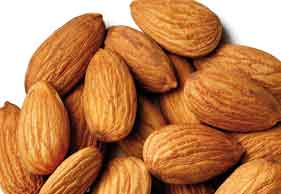Nuts and seeds are plant-based proteins that contain fibre and a combination of vitamins, minerals and antioxidants. They are also rich in plant sterols and heart-healthy mono- and polyunsaturated fats. Some of them contain omega 3 fatty acids and can help to improve the balance of cholesterol and reduce the risk of heart disease. However, nuts and seeds are also calorie-dense, so to get their health benefits without breaking the calorie bank, its best to substitute them for other foods in your diet, particularly those high in saturated fat. This can be achieved with one small handful a day.
HEALTHIEST NUTS
- Almonds have as much calcium as milk, and contain magnesium, vitamin E, selenium and lots of fibre. They can lower cholesterol and help prevent cancer.
- Walnuts are extremely good for your heart and brain, and contain ellagic acid, a cancer-fighting antioxidant. They are also a good source of alpha-linolenic acid (ALA), the plant-based form of omega-3.
- Pecans are rich in antioxidants and heart-healthy monounsaturated fats.
- Brazil nuts not only contain poly- and monounsaturated fats, but also contain more than 100 percent of your daily recommended value for the antioxidant selenium.
- Pine nuts have vitamins A, B, D and E, and contain 70% of your body’s daily required amino acids.
- Cashews are rich in minerals like copper, magnesium, zinc, iron and biotin. They are actually a low-fat nut, and like olive oil, have a high concentration of oleic acid, which is good for your heart. (Note: Cashews are not recommended for cancer patients due to potential levels of fungus.)
HEALTHIEST SEEDS
- Flaxseeds are the best source of omega-3s and the phytochemical Lignan, a super antioxidant that helps fight cancer. They also contain a lot of fibre and can reduce your risk of heart disease, stroke and diabetes.
- Sunflower seeds also help prevent heart disease and cancer with phytochemicals, folate, vitamin E, selenium and copper.
- Chia seeds are incredibly healthy, rich in omega-3 oils, protein, antioxidants, calcium and fibre.
- Pumpkin seeds are great for your immune system with lots of antioxidants (carotenoids), omega-3 fatty acids and zinc.
- Sesame seeds are a good source of calcium, magnesium, zinc, fibre, iron, B1 and phosphorus. They can lower blood pressure and protect against liver damage, and have also been linked to prevention of many diseases like arthritis, asthma, migraine headaches, menopause and osteoporosis.
GET YOUR DAILY FIX
To incorporate them in your daily diet, you can simply grab a handful of raw, unsalted nuts or seeds for an extremely satisfying and healthy snack, or make your own small bags of trail mix for a quick pick-me-up any time of the day. (If you can’t eat nuts and seeds without salt, buy them raw, roast them and sprinkle on a pinch of sea salt.) Other great ways to eat them include:
- Add nuts or seeds, especially chopped almonds and ground flaxseeds, to your salads, hot or cold cereals, yoghurt, smoothies or muffins. Remember that flaxseed has to be ground to receive its full benefits.
- Grind nuts up super fine to take the place of flour or breadcrumbs in recipes, or incorporate with breadcrumbs.
- Toast unsalted nuts like walnuts or pine nuts in a hot skillet and add to pasta, stir-fries, rice or vegetable dishes.
- Nut and seed butters are always so delicious, but stick to no more than one teaspoon a day. Try cooking with macadamia, peanut, sesame or grape seed oil – it’s best not to cook with flaxseed, hemp or walnut oil, they are much better for salad dressings.
Storage tip: The healthy fats in nuts and seeds can oxidise, destroying their nutritional value and their taste, so buy them in small quantities and store in a cool, dry place. You can also store any shelled nuts or seeds in an airtight container in your refrigerator or freezer.


